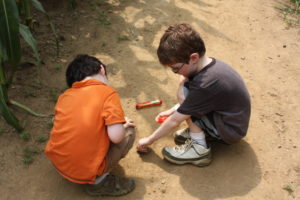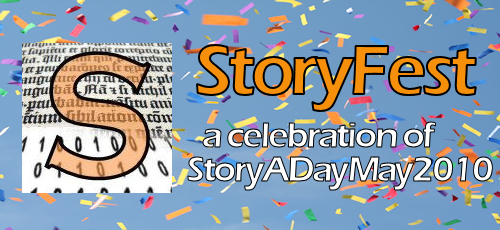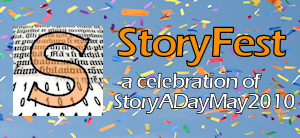As writers we’re curious. About everything. About people, technology, history, our neighbours, everything.
I’m particularly curious about other writers and how they work, what keeps them going, why they do it.
So here’s the first in a series of interviews with writers, starting with writers who took part in the StoryADay challenge last May.
 AdorablyAlice was one of our most active writers during the first challenge. In this interview she gives a lot of credit for her writing success to her secret weapon: her friend and mentor: Cid (also a StoryADay veteran). I’d love it if you’d leave a comment below, picking out one thing from this interview that stood out for you: something that sounded sooooo familiar it made you smile, or something you’d like to try in your own writing life.
AdorablyAlice was one of our most active writers during the first challenge. In this interview she gives a lot of credit for her writing success to her secret weapon: her friend and mentor: Cid (also a StoryADay veteran). I’d love it if you’d leave a comment below, picking out one thing from this interview that stood out for you: something that sounded sooooo familiar it made you smile, or something you’d like to try in your own writing life.
Before you started StoryADay how would you have described your writing life?
I used to write a lot when I was younger. Sometime after high school, I stopped. It wasn’t until NaNoWriMo 2009 that I began writing again. So between NaNo and StADa, I was still trying to find a balance between work, school, life and writing.
What made you decide to do StoryADay?
Cid. I found out about StADa through her, and because short story is my weakest point, I thought it would be a good challenge. Plus, I thought it would help me get into the habit of writing daily.
What did you expect to achieve? What did you actually achieve? What did you learn during the challenge?
I wanted to write something every day, and I wanted to get stronger at writing short stories. I did write everyday, but I think I’m still weak in writing short stories. I learned about Twitter fiction, which intrigued me, and I actually wrote a few TwitFic pieces.
How do you make time for writing?
This is a good question. And when I have an answer that doesn’t involve neglecting chores/cooking, I’ll let you know.
Why do you write? What keeps you motivated?
I am most productive on #writersdatenight (yes, I have to include the Twitter hashtag). Once a week a group of five writers (including myself) meet at McAllister’s to eat, socialize a little and write. Because the other four ladies have been writing longer than I have, I feel motivated to write a lot when I’m around them. The sound every one typing is motivating. I’ve tried other writing groups, but they’ve been more socializing than writing, so I don’t enjoy them as much. Lately, Cid has been setting goals for me. Write 5K and get a book. Write 5K and have a Glee marathon. It works. She’s awesome.
What are your aspirations?
Well, I’d love to be published and that’ s definitely a long term goal, but more short term…I’d like to finish a story. Well, I’ve finished a few, but I don’t revise. So a good aspiration would be to go back and revise…lol
Do you have a project or website you’d like to tell people about?
Well, there’s Book-Addicts. There are four of us (Cid’s one of them) and we basically review books across all genres, interview authors, have guest blog spots and book giveaways. It’s a pretty awesome place for people who are as addicted to reading as we are. www.book-addicts.com – get your fix!
I also have my personal website, www.adorablyalice.com, I keep up with how I’m doing as a writer, offering the lessons I learn as I delve into the mysterious ways of The Writer.
Thanks, Alice! (And you can read more about Alice’s experiences with her writers’ groups and productivity in this blog post – which features a fun cartoon from my own writing friend and secret mentor, Debbie Ohi.)
[And one more thing: I’d love to interview you about your writing, no matter what stage you’re at or whether or not you’ve done one of these creative challenges, so leave me a comment below if you’d be willing to chat.]









